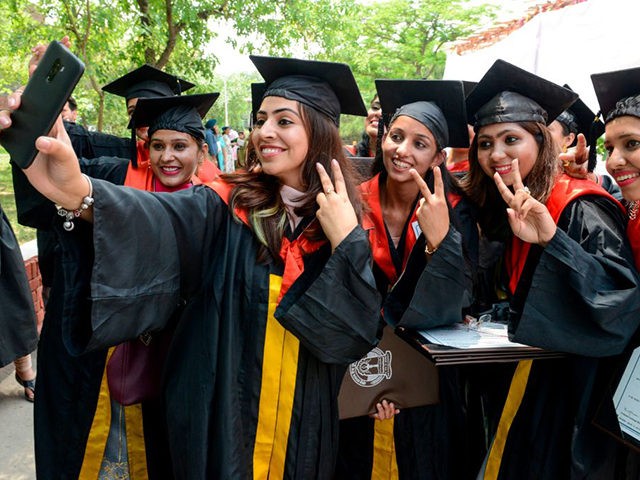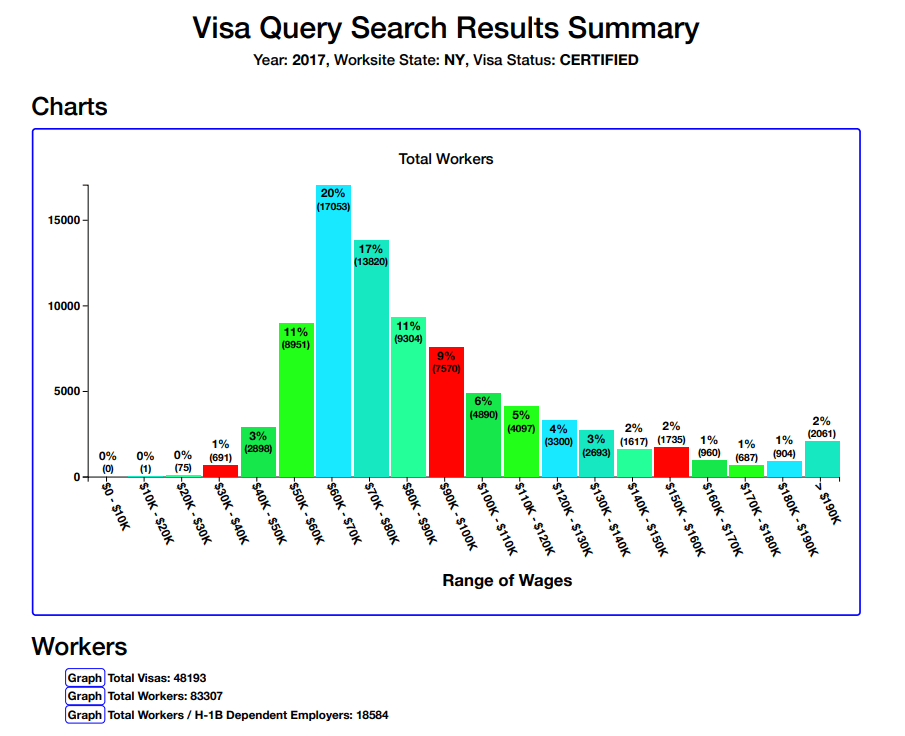U.S. and foreign companies have asked for H-1B visas to import 275,000 foreign graduates for white-collar jobs, according to an April 1 statement from the U.S. Citizenship and Immigration Services (USCIS) agency.
The requests are part of the annual H-1B work-visa process that is run by the USCIS at the Department of Homeland Security (DHS), and which is used by Fortune 500 companies to replace skilled American professionals with blocs of imported graduates.
The government process of importing H-1B workers is continuing despite the huge wave of layoffs that have hit many white-collar workers in the auto industry, in Silicon Valley, and even in hospitals.
Congress gives companies 85,000 H-1B visas each year. So the 275,000 applications will be put into a lottery and picked for the 85,000 visas by luck, not by skill or salaries.
The 85,000 new visa workers will be allowed to begin their reserved multiyear jobs in October, regardless of the unemployment rate for American graduates. Companies are not obliged to interview or hire Americans before they import H-1B workers. Universities, non-profit hospitals, and research centers are allowed to hire as many H-1Bs as they wish.
So far, President Donald Trump has not intervened to stop the white-collar jobs giveaway, despite his Inauguration Day promise of “Hire American,” and despite his weak polling support among college graduates in suburbia.
The H-1B program is just part one of many visa-worker programs that keep a population of up to 1.5 million foreign white-collar workers in the starter jobs that are needed by U.S. graduates to get into a field and to gain the experience necessary for promotion. For example, the multiyear H-1B visas allow roughly 900,000 foreign contract workers to hold white-collar jobs in the United States.
The agency released little data about the people being imported for the jobs or their claimed skill levels:
Nearly 275,000 unique registrations were submitted during the initial registration period. Roughly 46% of all registrations were for prospective beneficiaries with U.S. advanced degrees. There were more than 40,000 registration accounts created, and nearly 81% of submitted registrations were for potential beneficiaries from India (67.7%) and China (13.2%).
Officials are releasing less information about the H-1B workers than they did in 2017. For example, the agencies are no longer releasing the addresses where the H-1Bs are scheduled to work. The address data for the 2017 H-1Bs was released, and it allowed groups to show how many H-1Bs were working in the office buildings of Fortune 500 countries.
The USCIS press release also did not describe the skill levels of the H-1B workers, nor the promised pay levels.
In 2017, the federal data showed that employers asked for 83,307 workers for jobs in New York. Just 65 percent were rated as “Entry-Level” or “Qualified” workers. Just 11.4 percent were rated as “Experienced,” and a mere six percent were rated as “Fully Competent.”
The 2017 data also showed that 52 percent of the 2017 H-1B workers were supposed to be paid less than $80,000 for jobs in New York.
USCIS did not say how many H-1B workers are being sought by companies that lease their H-1B workers to Fortune 500 companies.
This staffing business has converted the H-1B program into the primary supplier of gig workers to the white-collar technology, banking, and insurance sectors. This massive supply of contingent workers raises stock values by lowering salaries that are paid to millions of American professionals.
Many of the H-1B applicants are foreign graduates who are already working in American jobs via the huge Optional Practical Training (OPT) and Curricular Practical Training (CPT) programs. These master degree programs allow colleges and universities — elite, average, and low-quality storefront colleges — to provide access to work permits to almost any foreigner who pays their tuition fees.
Forty-six percent of the 275,000 H-1B applicants hold “U.S. advanced degrees,” according to USCIS. Those numbers suggest that up to 126,000 resident OPT and CPT workers are asking for H-1B visas.
Most of the graduates in the OPT and CPT programs hope to win slots in the H-1B programs because it allows them to get better jobs and hugely valuable green cards.
The USCIS noted that most of the 275,000 applicants are Indians.
The 67.7 percent number indicates that 187,000 applicants are from India, underlining the scale of the U.S.-India Outsourcing Economy that has pushed a huge number of American graduates out of decent jobs in the technology, banking, and insurance industries. Nationwide, up to one million Indians hold white-collar jobs in the United States via the H-1B, OPT, CPT, L-1, H4EAD, and TN visa programs.
The growing role of Indian workers and managers in American offices has sparked widespread charges of favoritism and numerous lawsuits claiming discrimination against American graduates
Indian hiring managers will sell jobs to Indian job applicants for $5,000 to $10,000, one Indian H-1B told Breitbart News, describing the lucrative exchange of enormous peer pressure on honest Indian managers. “If you are honest, you can’t survive — you will become a bottleneck in the chain. … [Senior managers] will fire you.”
America managers do not sell jobs, he said, adding, “There are very few honest Indian managers — maybe one in a million. “
The work visas will not be sent to the lottery winners for several weeks after the companies submit petition packages with justifications for each visa. The deadline for submitting the petitions is June 30.
Those justifications include a so-called Labor Condition Application (LCA) document approved by the Department of Labor. The LCAs describe the intended job for each H-1B worker. Business advocates use the LCA process to claim that imported workers do not displace Americans.
But the LCA process does not require the companies to show that Americans cannot be hired for the job. Also, the LCA documents are rubber-stamped by the department. A department spokesman told Breitbart News:
Under current law, “the Secretary of Labor shall review such an [LCA] application only for completeness and obvious inaccuracies” and, unless the application is incomplete or obviously inaccurate, the Department must certify the LCA within seven days of receiving the employer’s application. [Emphasis added]
The current head of DHS, Chad Wolf, formerly served as a lobbyist for NASSCOM, which is the major trade group for the U.S. and Indian outsourcing companies that imports most of the H-1B gig workers. The group’s mix of Indian and U.S. companies use the H-1B program to extract salaries and wealth from the American college graduate class, and they split the gains among both countries’ executives and investors, plus the visa workers, their managers, and India’s government.
NASSCOM has additional lobbyists, according to federal records in Washington, DC. They have included John Engler, the former GOP governor of Michigan, and Spencer Abraham, a former GOP senator from Michigan. Abraham lost his Senate seat in 2000 after opposing a pro-American immigration reform bill. Since then, Michigan’s immigrant population has helped elect Democrats to Abraham’s former seat.
American professionals have organized to lobby against the H-1B program via the American Workers Coalition, U.S. TechWorkers, ProUSworkers, and White Collar Workers of America.
The new TechsUnite.US site was created to help U.S. graduates anonymously collaborate while shielded by encryption.
In turn, these groups are backed up by a few sites that track the scale and location of the outsourcing industry in each legislator’s district. The sites include SAITJ.org and H1BFacts.com. “The scope of this thing is really unbelievable,” said one researcher.
Other sites document the conflicts created by diverse foreign business practices in the United States. The non-political MyVisaJobs.com site also provides much information about H-1B outsourcing and green card rewards in multiple industries.


COMMENTS
Please let us know if you're having issues with commenting.